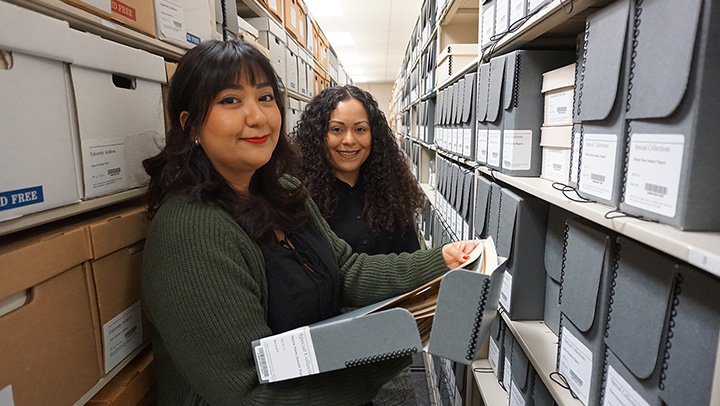Making San Diego’s Chicana/o History Available Around the World

Two members of the San Diego State University faculty will undertake the project “Unearthing the Chicana/o Movement in San Diego: Digitizing the Education Movimiento” thanks to a $300,000 “Digitizing Hidden Collections: Amplifying Unheard Voices” grant from the Council on Library and Information Resources (CLIR).
Erika Esquivel, Latin American and Indigenous Communities Archivist at the University Library, and Natalie Santizo, assistant professor of Chicana and Chicano Studies in the College of Arts and Letters are eager to get started on the 36-month project that will digitize 112.29 linear feet of archival materials (the stack would be taller than a 10-story building) about the Chicana/o education movement, including scrapbooks, correspondence, newsletters, newspapers, flyers, syllabi, and more.
In 1969, Chicanos from SDSU participated in drafting the historic Plan de Santa Bárbara that established the blueprint for Chicana/o higher education programs. The plan was used throughout the country to establish Chicano studies programs. SDSU is home to one of the first Chicana/o Studies departments in the nation, but it has been overlooked in the history of the Chicana/o education movement. This project challenges the presumption that the movement occurred solely in Los Angeles by expanding the geographical scope to the San Diego border region. Alongside digitizing materials like the Chicana/o Studies Department Papers, this project unearths Chicanas' hidden voices and labor required while pursuing higher education.
“This project makes visible a crucial part of not only our California history but also its continuing influence on the present,” said College of Arts and Letters Dean Todd Butler. “It’s precisely the type of work a publicly-committed research university should be doing.”
Once completed, the digitized materials will be browseable online and available for those interested in or researching the Chicano education movement worldwide.
“The Chicana/o Archive — a grassroots archive built alongside community members, SDSU faculty, staff, and community college faculty — is reflective of SDSU's mission to engage in community-centered learning and research,” Santizo said. “The Chicana/o Archive was established in 2007 to preserve the histories of Chicana/o people in the San Diego area. The collective represents a grassroots movement to uncover and preserve hidden voices of San Diego's history. In the last year, I have focused on creating a plan to re-activate, expand, and promote the Chicana/o Archive at SDSU, alongside Esquivel.”
The digitized collection will make these materials available to scholars worldwide. The archive, while covering many themes, is especially strong in Chicanas in higher education. Scholars hoping to research Chicanas, the development of Chicana/o Studies programs, and activists in San Diego will find the materials particularly fruitful.
“The materials that will be digitized are some of the most popular archival materials in Special Collections & University Archives (SCUA) documenting the history of the SDSU Chicana/o community and San Diego as a whole,” said Esquivel. “While SCUA is open to the public, digitizing these materials and providing bilingual descriptions will further enable community access online and help keep this important history alive. Previous digitization efforts of the Chicana/o Archive have been led by community members and donors; by pursuing and receiving this grant, we’re demonstrating our commitment to being ethical stewards of these collections.”
This grant is an excellent example of the creative projects that can be developed in cross-discipline collaboration. It also demonstrates the importance of the campus investing sustainable resources into supporting this work. Santizo and Esquivel’s positions were created to identify the needs of and pursue projects for the Latinx and Chicana/o community. Esquivel said, “We will be able to give these collections and history the attention they deserve.”
“This project is one of several we have pursued in recent years to expand access to, and promote use of, library collections representing the diversity of the San Diego community,” said Scott Walter, Dean of the University Library, “and it is especially notable because of the opportunities that have been built in to engage the community beyond the campus walls.”
The concluding portion of this project is a series of community workshops. Santizo said, “I am most excited to host the community archiving workshops, where community members will learn about archives and how primary sources are collected. Community members will get to bring personal items for digitization, receive archiving materials to preserve their items, and hear from other community members who have donated personal collections to Special Collections. We will also share some of the newly digitized items from the grant, and encourage attendees to utilize the digital collection.”
Both Santizo and Esquivel are excited about this project and have high hopes for the future of the collection and the community it represents. Santizo said, “I hope this project leads to a successful reactivation of the Chicana/o Archive grounded in community collaboration. I hope it demonstrates SDSU's commitment to community-collaborative projects grounded in preservation and expanding knowledge. Lastly, I hope it demonstrates the importance of working across departments and colleges when it comes to historical memory.”
Esquivel added, “My hope is that this project is just the beginning and that we can spark an interest in archiving both on and off campus.”

